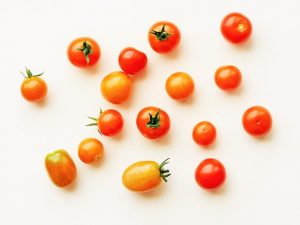Did you know that 30-40% of the food grown in America is wasted? [1]
That’s so much food! It’s awful to buy something and have it go to waste.
By reducing food waste, we save money by eating the food we have and not having to buy new food again. We also prevent resources like water and energy from being wasted on food that only gets sent to landfills.
In 2015, the U.S. Department of Agriculture and the U.S. Environmental Protection Agency set a goal to cut our nation’s food waste by 50% by the year 2030. As a consumer, there are many ways we can contribute to this goal and reduce food waste. Here are some of our top tips for avoiding food waste at home:
1. Plan your meals ahead of time
Planning out your meals for the week and making a grocery list with all the ingredients that you need can keep you focused on buying what you will actually use. You risk grabbing items that you may not plan to use if you go to the store without a list. These items may get pushed to the back of the pantry or fridge and forgotten.
2. Understand dates on food items
- The “Use by” dates found on food let you, the consumer, know when food should be eaten by. After that date, the quality of the food begins to decline and safety could be reduced.2
- “Sell by” dates are actually meant to inform the retailer, not the consumer, and are based on quality alone, not safety. After the sell-by date, a product typically has about one-third of its “life” remaining for you to use it at home.
- “Best by” dates are based solely on food quality.
Moral of the story: “Sell-by” and “Best by” dates refer to quality, not safety, and food may still be good to eat for a little while longer after. Food safety can decline quicker after the “Use by” date, however.
Make sure to follow food safety guidelines before eating. Remember, you can NOT tell if a food item is safe to eat by taste or smell.
3. Buy smaller quantities

If you notice you’re wasting something specific after every trip to the grocery store, try buying less of that product. For instance, if you can never make it through a whole container of lettuce before it spoils, try buying a smaller bag of lettuce or head of lettuce.
4. Be smart about eating out
When you eat out, you are losing the opportunity to eat some of the food you have at home. Try to eat the food you have before you consider eating out.
5. Store food properly

Storing your food properly can extend how long it stays fresh. For example:
- Eggs will stay fresher longer if you keep them in their carton rather than in the egg tray or door shelf.[3]
- Refrigerate perishable fruits and vegetables such as berries or mushrooms.
- Wait to wash fresh produce until just before using.
- Did you know that certain fruits and vegetables release a gas, called ethylene, that causes produce to ripen and spoil faster? Some fruits and vegetables are more sensitive to ethylene than others. If an ethylene sensitive item is stored next to an ethylene producing item, it can spoil faster. For example, storing tomatoes (ethylene producer) next to cucumbers (ethylene sensitive) can cause the cucumbers to go bad quicker. Here’s a full list.
- Using airtight containers to store cut produce can keep it fresh longer.
- Consider buying whole loaves of bread, not sliced bread. Bread will go bad quicker once it is sliced. Cut off what you want to eat.
- To store bread long term, put it in an airtight container or store it in a bag and place it in the freezer. Then let it completely thaw before taking it back out of the container.[4]Surprisingly, placing bread in the refrigerator only makes the bread become stale faster.
6. Repurpose food that’s about to spoil

There are many ways to use food that’s about to spoil. Here are some of our favorite ways to rescue food just in time:
- Fruit getting mushy? Wash it, cut it up, and freeze it in an airtight container or bag in the freezer for smoothies later.
- Bananas have brown spots? If you’re not going to freeze them for smoothies, try making banana bread. The brown color means the starch in the banana has broken down into sugar so it will have a sweeter taste!
Fun fact: Bananas are ethylene producers AND ethylene sensitive. Their own high production of ethylene can speed up bananas’ ripening process.[5] Keeping bananas in a bag will trap the ethylene gas and speed up the ripening process even more.
- Vegetables starting to go bad? Wash them, cut them up, and throw them in a soup. While a slightly mushy vegetable might be off-putting on their own, you can’t tell a difference when they’re softened in a soup. Here are more ways to revive your wilted produce.
Written by Taylor Newman, Ph.D. Candidate | Edited by Laurel Sanville, MS, RDN, LD
Original photo sources: